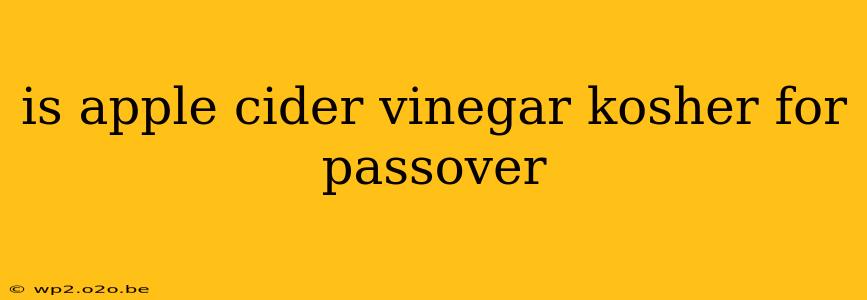The question of whether apple cider vinegar is kosher for Passover is more nuanced than a simple yes or no. The answer depends heavily on several factors, primarily the production process and any added ingredients. This guide will explore these factors in detail, helping you make an informed decision for your Passover Seder.
Understanding Kosher for Passover Certification
Before diving into the specifics of apple cider vinegar, it's crucial to understand what makes a product "kosher for Passover." This certification signifies that a product meets the stringent dietary laws of Passover, which includes prohibitions against chametz (leavened grains) and specific grains, such as wheat, barley, oats, rye, and spelt. The process also involves ensuring no cross-contamination with chametz occurs during production and packaging. A reliable kosher certification agency, such as the Orthodox Union (OU), Kof-K, or other recognized organizations, verifies compliance with these rules.
Apple Cider Vinegar: The Production Process
Apple cider vinegar is typically made by fermenting apple juice. This process itself doesn't inherently violate Passover laws. However, the key is whether chametz-containing ingredients or equipment are used during any stage of production. Some manufacturers might utilize equipment that also processes wheat or other prohibited grains. This cross-contamination could render the final product not kosher for Passover.
Potential Sources of Chametz Contamination:
- Filtering and processing aids: Some manufacturers might use filtering aids derived from wheat or other grains.
- Shared equipment: If the same equipment is used for processing both apple cider vinegar and products containing chametz, contamination is a possibility.
- Added ingredients: Many commercially produced apple cider vinegars contain added ingredients like sugar, preservatives, or flavorings. These additives must also be kosher for Passover and free from chametz.
How to Determine if Your Apple Cider Vinegar is Passover-Approved
To ensure your apple cider vinegar is kosher for Passover, look for the following:
- A reliable Kosher for Passover certification: Check the bottle's label for a symbol from a reputable kosher certification agency. The symbol should specifically indicate that it's kosher for Passover, not just kosher year-round. Look for the Passover symbol alongside the year it is valid for.
- Ingredient list review: Carefully examine the ingredient list. It should be free from any chametz-containing ingredients or their derivatives.
- Manufacturer's contact information: If unsure, contact the manufacturer directly. They can clarify the production process and confirm whether the vinegar is kosher for Passover.
Choosing the Right Apple Cider Vinegar for Your Passover Seder
To be safe, select apple cider vinegars explicitly labeled "Kosher for Passover" by a trusted certification agency. This ensures the product meets the highest standards of Passover observance and avoids any potential risks of chametz contamination. Don't rely solely on the general "kosher" label; it's crucial to see the Passover certification as well.
Conclusion
In short, while the base ingredient of apple cider vinegar (apples) is inherently kosher, the processing and potential for chametz contamination during manufacturing are crucial factors. Always check for a reliable Kosher for Passover certification on the label to ensure it's suitable for your Seder. Don't hesitate to contact the manufacturer for clarification if necessary. Observing Passover with care and accuracy is paramount, and ensuring kosher products adds to the holiness of the occasion.

